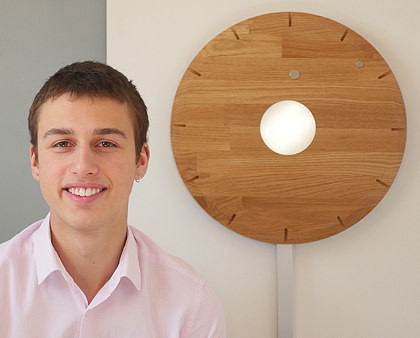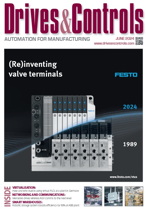Magnet-flipping clock wins Young Engineer of the Year award

A first-year student at Imperial College in London has won the 2020 GSK UK Young Engineer of the Year award for his design of a minimalist electromechanical clock in which tells the time using small disc-shaped magnetic “hands” that flip over on a wooden face. Chris Kalogroulis, 18, who is studying design engineering, wanted to create a product which has an aesthetic appeal, but would allow him to apply his mechanical, electronics and programming skills.
More than 300 young people were selected as finalists in The Big Bang Competition, an annual contest that recognises and rewards achievements in science, technology, engineering and maths (STEM), as well as helping the entrants to build skills and confidence in project-based work. The finals usually take place at The Big Bang Fair in March but when this year’s Fair was cancelled because of the coronavirus, the finalists were asked to submit video presentations from which 50 STEM professionals picked the winners.
The Young Scientist Of The Year Award went to 12 year-old Diya Vincent for a project in which she grew microgreens using fertilised water from an aquarium in just 10 days. As part of the project, called Microgreens from Goldfish, the Year 7 student from Sevenoaks School in Kent, grew microgreens using three different methods.
The winners each receive £2,000 in prize money to continue on their STEM work, as well as a trophy and certificate.

Kalogroulis says that winning the engineering competition “has given me confidence in my product and spurred me on to take this further and I will be able to invest the prize money into launching this on Kickstarter. My parents, brother and sister are all engineers, and my brother and I have always dreamed of setting up a design company to bring our ideas to life. Hopefully, everyone at home will be using a product we’ve made in the not-too-distant future.”
“The judges have been blown away by the quality of entries from all the finalists – not only for their brilliant new ideas but for how eloquently they spoke about them in their videos that were submitted,” says Hilary Leevers, chief executive of EngineeringUK, which organises the competition. “We’ve also been really impressed with all of the students for their passion and resilience in taking part in spite of the hugely challenging circumstances, including some students being in self-isolation during the process.”
“It certainly bodes well for the future that the engineers, scientists and inventors of tomorrow are already producing such astute and creative project work.”





